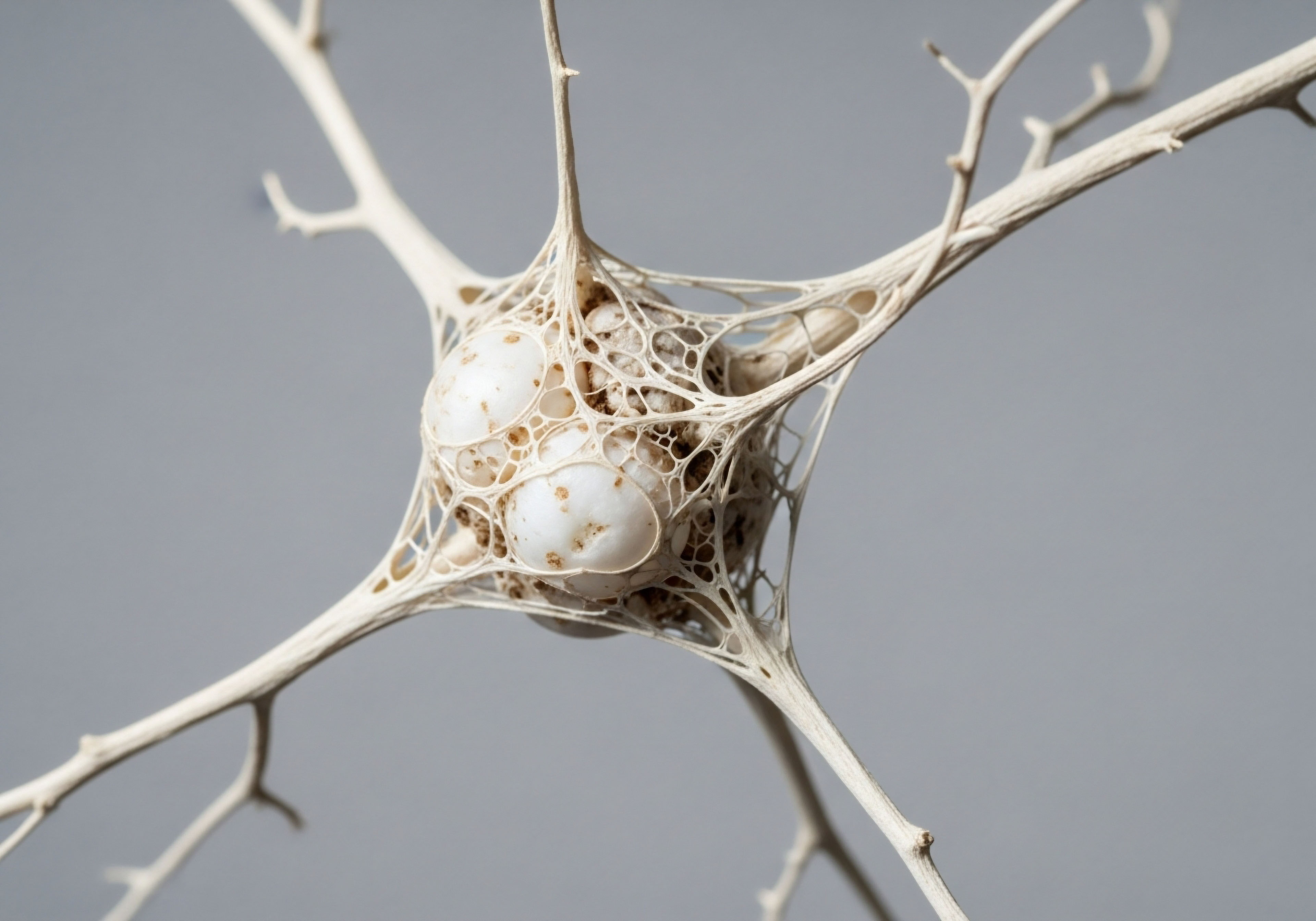

Fundamentals
Experiencing shifts in your cognitive clarity, perhaps a subtle fog or a feeling of diminished mental acuity, can be disorienting. When these changes coincide with other bodily alterations, a deeper inquiry into your internal systems becomes not just a medical consideration, but a personal imperative.
Many individuals report a sense of disconnect from their former selves, a quiet erosion of the sharp thinking they once relied upon. This lived experience, often dismissed as a normal part of aging or stress, frequently points to underlying biological mechanisms, particularly within the intricate network of your endocrine system.
The human body operates through a sophisticated communication network, where chemical messengers orchestrate countless functions. Among these messengers, hormones play a central role, influencing everything from mood and energy levels to the very sharpness of your thought processes. When this delicate balance is disrupted, the effects can ripple throughout your entire system, impacting areas you might not immediately associate with hormonal activity, such as cognitive function. Understanding these connections is the initial step toward reclaiming your vitality.
Cognitive shifts, often felt as mental fogginess, can signal underlying hormonal imbalances within the body’s complex endocrine system.

Understanding GnRH Modulators
Gonadotropin-releasing hormone (GnRH) modulators are a class of medications designed to influence the body’s natural production of sex hormones. These agents are commonly used in various clinical scenarios, including the management of certain hormone-sensitive cancers, endometriosis, and uterine fibroids. Their primary mechanism involves either stimulating or suppressing the pituitary gland’s release of gonadotropins, which in turn regulate the gonads’ production of testosterone and estrogen.
When GnRH modulators are administered, they can induce a state of hypogonadism, essentially creating a temporary or sustained reduction in sex hormone levels. While this effect is therapeutically beneficial for the conditions they treat, it can also lead to a range of systemic effects. The brain, being highly sensitive to hormonal fluctuations, is particularly susceptible to these changes. The resulting decline in circulating sex hormones, such as estrogen and testosterone, can manifest as noticeable alterations in cognitive performance.

Hormones and Brain Function
Sex hormones are not merely involved in reproductive processes; they exert widespread influence on the central nervous system. Estrogen, for instance, plays a significant role in neuronal health, synaptic plasticity, and neurotransmitter synthesis. It supports memory consolidation, verbal fluency, and overall cognitive processing. A reduction in estrogen levels can therefore impact these functions, leading to symptoms such as memory lapses, difficulty concentrating, and a general slowing of thought.
Similarly, testosterone, often considered a male hormone, is critically important for cognitive function in both men and women. It influences spatial memory, executive function, and mood regulation. Adequate testosterone levels are associated with better cognitive performance and a sense of mental vigor. When GnRH modulators suppress testosterone, individuals may experience reduced mental clarity, diminished motivation, and even depressive symptoms. The brain’s intricate architecture relies on these biochemical signals for optimal operation.
The interplay between these hormones and brain health extends beyond direct neuronal effects. Hormones also influence cerebral blood flow, glucose metabolism, and inflammation, all of which are critical for sustained cognitive function. A decline in hormonal support can therefore create a less optimal environment for brain cells, contributing to the cognitive changes observed during GnRH modulator therapy. Recognizing this fundamental connection is essential for addressing the symptoms experienced.


Intermediate
Addressing the cognitive shifts associated with GnRH modulator therapy requires a precise understanding of how hormonal optimization protocols can restore balance. These therapies are not about merely replacing what is missing; they are about recalibrating the body’s internal messaging system to support optimal brain function and overall vitality. The goal is to mitigate the unintended cognitive consequences by carefully reintroducing or modulating specific biochemical signals.
The endocrine system operates like a sophisticated orchestra, where each hormone plays a specific instrument, and their collective sound creates the symphony of your health. When GnRH modulators silence certain sections of this orchestra, the overall performance can suffer. Hormonal therapies aim to bring those sections back into harmony, allowing the brain to function with its full capacity.
Hormonal optimization protocols aim to recalibrate the body’s endocrine system, restoring balance to mitigate cognitive changes induced by GnRH modulators.

Targeted Hormonal Optimization Protocols
Personalized wellness protocols involve a careful assessment of an individual’s unique hormonal profile and symptoms. For those experiencing cognitive changes due to GnRH modulator use, specific hormonal interventions can be considered. These interventions are designed to counteract the induced hypogonadal state while respecting the primary therapeutic goals of the GnRH modulator.

Testosterone Replacement Therapy for Men
For men undergoing GnRH modulator therapy, the resulting suppression of testosterone can lead to significant cognitive impairment, alongside other symptoms like reduced muscle mass and energy. Testosterone Replacement Therapy (TRT) is a well-established protocol to address these deficiencies. A standard approach often involves weekly intramuscular injections of Testosterone Cypionate, typically at a concentration of 200mg/ml. This consistent delivery helps maintain stable physiological levels of the hormone.
To preserve aspects of natural endocrine function and fertility, particularly in younger men or those with specific goals, additional agents are often incorporated. Gonadorelin, administered via subcutaneous injections twice weekly, can stimulate the pituitary gland, supporting the natural production of testosterone and maintaining testicular function.
The conversion of testosterone to estrogen can sometimes lead to undesirable effects, including cognitive ones. To manage this, an aromatase inhibitor like Anastrozole is often prescribed as an oral tablet, typically twice weekly, to block this conversion and maintain a healthy estrogen-to-testosterone ratio. In some cases, Enclomiphene may be included to specifically support luteinizing hormone (LH) and follicle-stimulating hormone (FSH) levels, further aiding endogenous testosterone production.

Hormonal Balance for Women
Women experiencing cognitive changes from GnRH modulators, particularly those affecting estrogen and testosterone levels, also benefit from tailored hormonal support. Protocols vary based on menopausal status and individual needs.
- Testosterone Cypionate ∞ Administered via subcutaneous injection, typically 10 ∞ 20 units (0.1 ∞ 0.2ml) weekly. This low-dose approach can significantly improve cognitive clarity, libido, and energy without inducing masculinizing effects.
- Progesterone ∞ Its use is determined by menopausal status. For pre-menopausal and peri-menopausal women, progesterone can help regulate cycles and support mood and sleep, indirectly benefiting cognitive function. In post-menopausal women, it is often prescribed alongside estrogen (if also being replaced) for uterine protection.
- Pellet Therapy ∞ Long-acting testosterone pellets offer a convenient, sustained-release option. These are surgically inserted under the skin and release a consistent dose of testosterone over several months. When appropriate, Anastrozole may be co-administered to manage estrogen conversion, similar to male protocols, especially if higher testosterone doses are used or if estrogen sensitivity is a concern.

Growth Hormone Peptide Therapy
Beyond sex hormones, certain peptides can play a supportive role in overall metabolic and cognitive health, particularly for active adults seeking enhanced vitality. These peptides work by stimulating the body’s natural production of growth hormone, which has widespread systemic benefits.
Growth hormone influences cellular repair, metabolic regulation, and neurological function. By optimizing growth hormone levels, these peptides can contribute to improved sleep quality, which is vital for cognitive restoration, and support neuronal health.
| Peptide Name | Primary Mechanism | Potential Cognitive Benefits |
|---|---|---|
| Sermorelin | Stimulates natural growth hormone release from the pituitary. | Improved sleep quality, general vitality. |
| Ipamorelin / CJC-1295 | Potent growth hormone secretagogues, sustained release. | Enhanced sleep architecture, mental clarity, cellular repair. |
| Tesamorelin | Growth hormone-releasing factor analog. | Metabolic support, potential neuroprotective effects. |
| MK-677 | Oral growth hormone secretagogue. | Supports sleep, appetite, and overall growth hormone axis. |

Post-TRT or Fertility-Stimulating Protocols for Men
For men who have discontinued TRT or are actively trying to conceive, a specific protocol is implemented to restore endogenous testosterone production and support fertility. This approach is critical for maintaining overall hormonal balance, which in turn supports cognitive function.
- Gonadorelin ∞ Continues to stimulate the pituitary, encouraging natural testosterone production.
- Tamoxifen ∞ A selective estrogen receptor modulator (SERM) that blocks estrogen’s negative feedback on the pituitary, thereby increasing LH and FSH release and stimulating testicular testosterone production.
- Clomid ∞ Another SERM with a similar mechanism to Tamoxifen, often used to stimulate gonadotropin release and restore fertility.
- Anastrozole ∞ Optionally included to manage estrogen levels during the recovery phase, preventing excessive estrogen conversion as testosterone levels rise.
These carefully structured protocols demonstrate a commitment to restoring systemic balance, which is a cornerstone of mitigating cognitive changes. The body’s systems are interconnected, and supporting one often yields benefits across multiple domains, including the intricate functions of the brain.


Academic
The profound influence of the endocrine system on cognitive function, particularly in the context of GnRH modulator therapy, extends to the molecular and cellular levels. A deep exploration of this interplay reveals how precise hormonal interventions can recalibrate neural pathways and metabolic processes, thereby mitigating cognitive decline. The brain is not merely a passive recipient of hormonal signals; it actively responds and adapts, with its intricate networks relying on a stable biochemical environment.
When GnRH modulators induce a state of hypogonadism, the resulting decline in sex steroids ∞ primarily estrogen and testosterone ∞ has direct consequences for neuronal health and synaptic plasticity. These hormones are recognized as neurosteroids, capable of influencing gene expression, protein synthesis, and neurotransmitter systems within the central nervous system. Their absence creates a cascade of effects that can compromise cognitive integrity.
Hormonal interventions can recalibrate neural pathways and metabolic processes, mitigating cognitive decline by restoring essential neurosteroid signaling.

Neuroendocrine Axes and Cognitive Resilience
The human body’s neuroendocrine axes, particularly the Hypothalamic-Pituitary-Gonadal (HPG) axis and the Hypothalamic-Pituitary-Adrenal (HPA) axis, are deeply interconnected and exert a collective influence on cognitive resilience. GnRH modulators directly target the HPG axis, suppressing gonadal hormone production. This suppression, while therapeutically beneficial for specific conditions, can indirectly impact the HPA axis, which governs the stress response. Chronic stress and dysregulation of the HPA axis are known contributors to cognitive impairment, affecting memory, attention, and executive function.
Research indicates that sex hormones modulate the HPA axis’s sensitivity and reactivity. For instance, estrogen can influence cortisol metabolism and receptor density in brain regions critical for stress regulation, such as the hippocampus and prefrontal cortex. A reduction in estrogen due to GnRH modulation might therefore lead to an exacerbated stress response, contributing to cognitive symptoms.
Testosterone also plays a role in dampening the HPA axis activity, promoting a more balanced physiological response to stressors. Hormonal therapies, by restoring sex steroid levels, can help re-establish a more adaptive HPA axis function, thereby supporting cognitive resilience.

How Do Hormonal Therapies Influence Neurotransmitter Systems?
The impact of sex hormones on neurotransmitter systems is a critical aspect of their cognitive effects. Estrogen, for example, influences the synthesis, release, and receptor sensitivity of several key neurotransmitters:
- Acetylcholine ∞ Essential for learning and memory. Estrogen has been shown to upregulate cholinergic activity in the hippocampus and basal forebrain.
- Serotonin ∞ A primary regulator of mood, sleep, and appetite, with indirect effects on cognition. Estrogen can modulate serotonin receptor expression and reuptake.
- Dopamine ∞ Involved in motivation, reward, and executive function. Testosterone and estrogen both influence dopaminergic pathways, affecting attention and cognitive flexibility.
- GABA (Gamma-aminobutyric acid) ∞ The primary inhibitory neurotransmitter, crucial for calming neural activity. Hormones can modulate GABAergic tone, influencing anxiety and cognitive processing speed.
When GnRH modulators reduce sex hormone levels, the delicate balance of these neurotransmitter systems can be disrupted, leading to the observed cognitive changes. Hormonal optimization protocols aim to restore these modulatory influences, thereby supporting optimal neurotransmitter function and, consequently, cognitive performance.

Metabolic Pathways and Brain Energetics
Beyond direct neurochemical effects, sex hormones significantly influence brain energetics and metabolic pathways. The brain is a highly metabolically active organ, relying on a consistent supply of glucose and efficient mitochondrial function. Estrogen and testosterone play roles in regulating cerebral glucose uptake, insulin sensitivity within the brain, and mitochondrial biogenesis.
A decline in these hormones can lead to impaired glucose utilization in certain brain regions, potentially contributing to energy deficits at the cellular level. This metabolic dysregulation can manifest as reduced mental stamina, difficulty with complex tasks, and a general feeling of cognitive fatigue. Hormonal therapies, by restoring the metabolic support provided by sex steroids, can help optimize brain energetics, ensuring neurons have the necessary fuel for sustained cognitive activity.
| Hormone | Key Metabolic Influence | Cognitive Relevance |
|---|---|---|
| Estrogen | Enhances cerebral glucose uptake; supports mitochondrial function. | Improved mental stamina, reduced cognitive fatigue. |
| Testosterone | Modulates insulin signaling in the brain; influences neurogenesis. | Supports executive function, spatial memory. |
| Growth Hormone | Promotes cellular repair; influences protein synthesis. | Neuroprotective effects, overall brain health. |
The intricate relationship between hormonal status, neurotransmitter balance, and brain metabolism underscores the systems-biology perspective required to address cognitive changes from GnRH modulators. By carefully recalibrating the endocrine environment, personalized wellness protocols offer a path to restoring not just hormonal levels, but the fundamental biological processes that underpin robust cognitive function. This comprehensive approach recognizes the brain as an integral part of the larger physiological network, responding dynamically to its internal biochemical landscape.

References
- Maki, P. M. & Hogervorst, E. (2017). Estrogen and cognitive function ∞ A review of clinical and preclinical studies. Hormones and Behavior, 90, 1-11.
- Davis, S. R. & Wahlin-Jacobsen, S. (2015). Testosterone in women ∞ the clinical significance. The Lancet Diabetes & Endocrinology, 3(12), 980-992.
- Miller, K. K. et al. (2010). Effects of growth hormone and IGF-I on cognitive function. Growth Hormone & IGF Research, 20(2), 115-120.
- Gao, X. et al. (2016). Gonadotropin-releasing hormone agonists and cognitive function ∞ A systematic review. Journal of Clinical Endocrinology & Metabolism, 101(11), 4001-4010.
- Boron, W. F. & Boulpaep, E. L. (2017). Medical Physiology ∞ A Cellular and Molecular Approach. Elsevier.
- Guyton, A. C. & Hall, J. E. (2020). Textbook of Medical Physiology. Elsevier.
- Snyder, P. J. et al. (2016). Effects of testosterone treatment in older men. New England Journal of Medicine, 374(7), 611-621.
- Stanczyk, F. Z. (2003). Estrogen replacement therapy ∞ The role of estradiol and conjugated estrogens. Menopause, 10(6), 493-500.

Reflection
Considering your own biological systems and the intricate dance of hormones within them is a powerful act of self-discovery. The insights gained from understanding how GnRH modulators affect cognitive function, and how targeted hormonal therapies can offer support, represent a significant step toward reclaiming your vitality.
This knowledge is not merely academic; it is a lens through which you can view your own experiences, transforming vague symptoms into actionable pathways for well-being. Your personal journey toward optimal health is precisely that ∞ personal ∞ and it warrants a thoughtful, informed approach.



